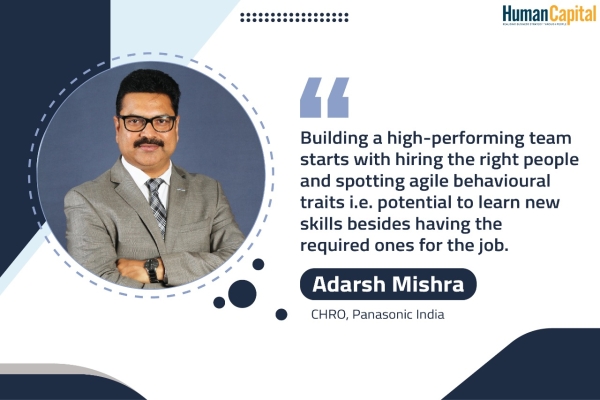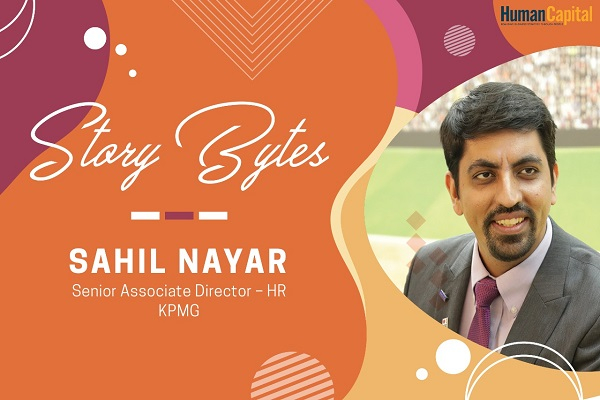The pandemic has made organisations realise that managing talent is no longer a responsibility of the ‘Human Resources department’ alone, but a shared responsibility of management across levels cultivating strong co-worker relationships.
The COVID-19 pandemic has created a paradigm shift in organisational behaviour, ensuring adjustments wrt to operations and the overall functioning of organisations. However, amidst the dark clouds of the pandemic, there emerged a silver lining that made organisations a close-knit community. In fact, the shared challenges of the pandemic have redefined the relationship between management and employees, reinforcing the belief in key human values, and reinstating the importance of the workplace as the second home.
Employees today are communicating and collaborating openly within teams. They have a genuine sense of compassion for their fellow colleagues to take extra care of their overall well-being (emotional and physical). The pandemic has made organisations realise that managing talent is no longer a responsibility of the ‘Human Resources department’ alone, but a shared responsibility of management across levels cultivating strong coworker relationships. It has been a learning curve for organisations to strengthen their resource management capabilities and create future leaders.
Employee engagement to nurture a conducive environment
Now, the key question here is - how does an organisation create a conducive environment to attract and retain talent? Ensuring a conducive environment, where mutual respect, compassion, care, and integrity stood up as main pillars during the pandemic became one of the biggest challenges for many organisations. To overcome the same, organisations must proactively reach out to employees to understand their challenges and act swiftly on employee inputs for their overall well-being. Further, during WFH employees faced issues wrt to digital fatigue as a result of longer working hours and increased screen time; followed by loss of visibility, collaboration, and relationships with colleagues, potentially disrupting their work/life balance in the long run.
Internal networking platforms such as Workplace by Facebook helped employers communicate effectively with their people, keeping them motivated and engaged from a distance. Such tools played a significant role in today’s hybrid scenario, seamlessly helping organise employee engagement initiatives, virtual training, Workplace Live management sessions, CEO Townhall amongst others. Such tools ensure business continuity and regular engagements with motivational speakers, spiritual gurus, nutritionists, and psychologists to keep a check on employees’ mental well-being. Similarly, the in-house learning platforms help employees learn and upgrade their skills. Such tools have helped organisations leverage the smart technologies and apply them for the well-being of the employees.
Right fit for a right mix
The next step is to build a collaborative environment that helps balance the scale of performance and potential of an employee. A motivated and happy workforce is key to sustained productivity, and, is a long-term investment. Building a high-performing team starts with hiring the right people and spotting agile behavioural traits i.e. potential to learn new skills besides having the required ones for the job. Every organisation needs to discover and attract ambitious people who resonate with its values, and, imbibe the vibrant culture amicably. In today’s scenario, when the job market is gradually opening up, organisations are looking for candidates with capabilities exhibiting a positive character. Every organisation needs to discover and attract candidates who are ambitious, resilient and humble by nature. Diversity is another factor that helps increase team collaboration, innovation, and competitiveness. Therefore, recruiting people who trust the values of the company will assist in building a diverse team.
Strengthening employee advocacy, strengthening morale
Amidst the pandemic, the most important aspect was to communicate and involve employees and get them enthused about the initiatives and decisions undertaken by the organisation. Employee focused campaigns aided many organisations to entertain, rejuvenate and improve the mental well-being of the workforce. In the current day and age when organisations are looking at returning to pre-COVID normalcy, it is important to align employees with the organisation’s values and engage with them on key matters.
For instance, when we resumed our operations postpandemic, we divided our India Headquarters into three zones with each zone operating as an individual office with separate entry points, washrooms and other amenities. The #RoadToReturn campaign further helped in creating awareness for employees about the safety measures undertaken and, encouraged others to join back work physically. Companies still need to continue to exercise caution, follow safety guidelines, maintain social distancing at office premises, send internal communication with all safety measures to ensure the hygiene of the employees, despite resuming WFO at 100% capacity. Therefore, in a nutshell, people-focused work culture will predominantly become the measure of a brand’s success and navigate uncertainty.
Enroute to a sustainable culture
In order to foster a positive work culture, organisations need to keep employees at the centre to ensure business continuity. As HR leaders, we strive to build on employee experience by strengthening the organisation’s culture DNA for shared success and driving openness and accountability at the workplace. Leaders must demonstrate trust and fairness at every level and communicate promises clearly and explicitly so that there is no misunderstanding among employees. Despite the fact that technology makes formal communication and cooperation more effective, it does not enable emotional involvement or possibilities for informal learning from peers. Employers need to continue to leverage technology through internal engagement platforms to collaborate with each other, leveraging collective wisdom for the organisation’s growth.
Has COVID-19 forever changed the way we live and work?
Trending
-
SBI General Insurance Launches Digital Health Campaign
-
CredR Rolls Out 'Life Happens' Leave For Its Employees
-
Meesho Announces 30-Week Gender-Neutral Parental Leave Policy
-
Microsoft Unveils Tech Resilience Curriculum To Foster An Inclusive Future
-
60% Indian Professionals Looking For Job Change Due To COVID: Survey
-
SpringPeople And Siemens Collaborate For Digital Transformation Push
-
86% Professionals Believe Hybrid Work Is Essential For Work Life Balance: Report
-
Almost 1 In Every 3 People's Personal Life Affected Due To Work Stress
-
Meesho Rolls Out Reset And Recharge Policy For Employees
-
80% Of Talent Leaders & Academics Say Pandemic Changed Skill Needs For Youth: Report
-
Hero Electric Rolls Out 'Hero Care' Program For Employees
-
Human Capital In Collaboration With ASSOCHAM Hosts Virtual Conference
-
IKEA India, Tata STRIVE Collaborate To Create Employability And Entrepreneurship Opportunities
-
SAP India, Microsoft Launch Tech Skilling Program for Young Women
-
DXC Technology, NASSCOM Collaborate For Employability Skills Program
-
Lenskart To Hire Over 2000 Employees Across India By 2022
-
Mindtree Launches Learn-and-Earn Program
-
Tata AIA Extends 'Raksha Ka Teeka' To Its Employees
-
Swadesh Behera Is The New CPO Of Titan
-
NetConnect Global Plans To Recruit 5000 Tech Professionals In India
-
Hubhopper Plans To Hire 60% Of Indian Podcasters By 2022
-
Corporate India Needs More Women In Leadership Roles: Report
-
Aon to Invest $30 Million and Create 10,000 Apprenticeships by 2030
-
Tech Mahindra Launches ‘Gift a Career’ Initiative for Upskilling of Youth
-
40% Women Prefer Flexible Working Options in Post-COVID World: Survey
-
3 out of 4 companies believe they can effectively hire employees virtually: Report
-
Vodafone , CGI and NASSCOM Foundation launch digital skills platform
-
Odisha: Bank, postal employees to deliver cash for elderly, differently-abled persons
-
Skill India launches AI-based digital platform for "Skilled Workforce"
-
Hiring activity declines 6.73% in first quarter: Survey
-
70% startups impacted by COVID-19 pandemic
-
Bajaj Allianz Life ropes in Santanu Banerjee as CHRO
-
Over 70 Percent MSMEs look at cutting jobs to sustain businesses
-
93 Per Cent employees stressed about returning to office post-lockdown
-
Johnson & Johnson India announces family benefits for same gender partners
-
Indian firms turning friendly towards working mothers
-
Welspun India names Rajendra Mehta as new CHRO
-
Wipro partners with NASSCOM to launch Future Skills platform



Human Capital is niche media organisation for HR and Corporate. Our aim is to create an outstanding user experience for all our clients, readers, employers and employees through inspiring, industry-leading content pieces in the form of case studies, analysis, expert reports, authored articles and blogs. We cover topics such as talent acquisition, learning and development, diversity and inclusion, leadership, compensation, recruitment and many more.
Subscribe Now













































Comment